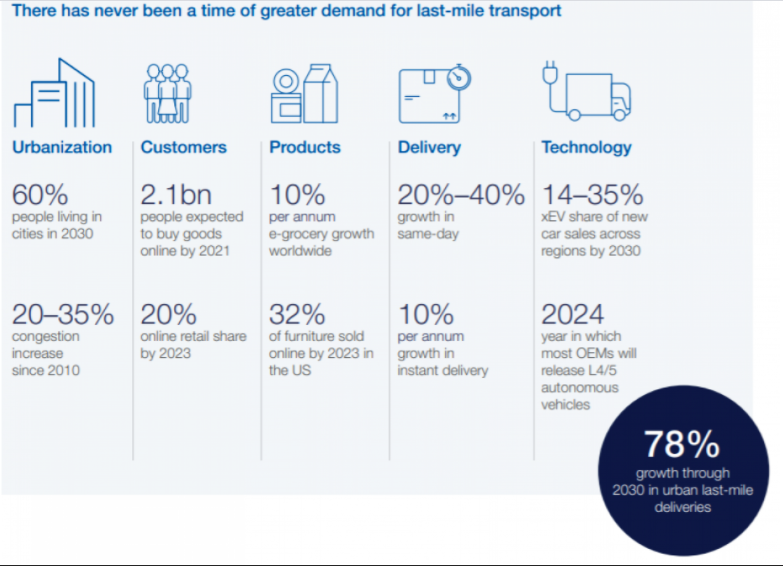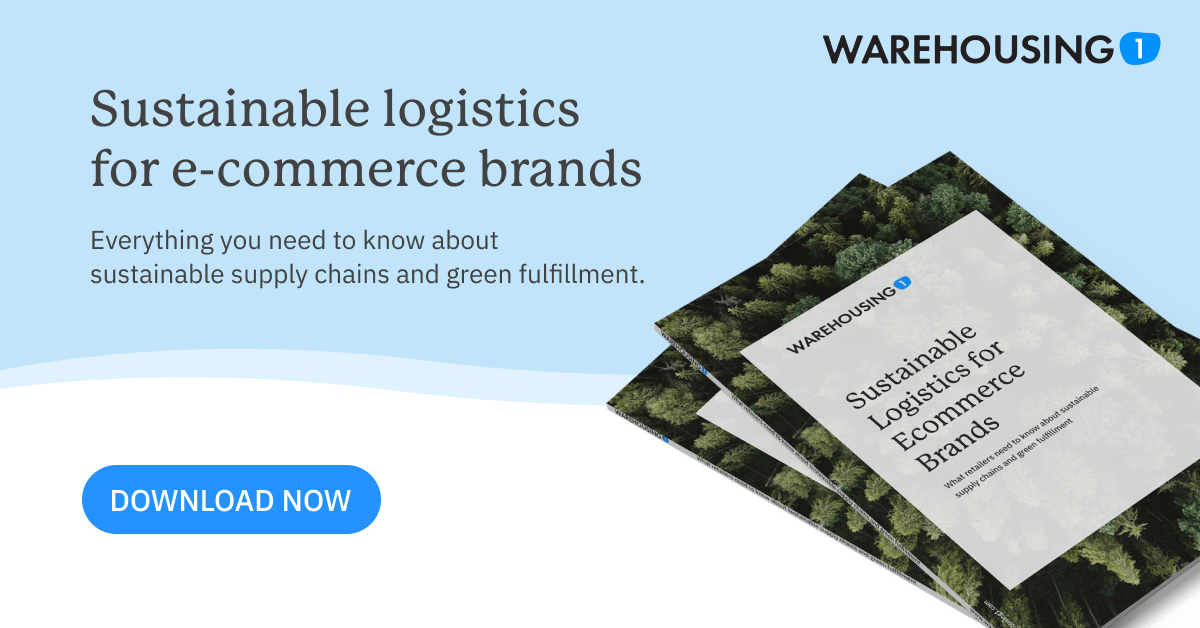Logistics 2021: Focus on sustainability
At the German Logistics Congress 2020, Dr. Sigrid Nikutta, Member of the Board of Management for Freight Transport at Deutsche Bahn AG, spoke of a historic age for sustainability in logistics. As according to Deutschen Logistik-Kongress 2020 of a historic age for sustainability in logistics. As the logistics and transport industry, according to a WEF studies the logistics and transport industry is responsible for around 5.5% of all CO2 emissions there will also be a significant focus on sustainable optimization of all logistics processes in 2021. In our last blog post, you can read about the importance of a company's commitment to fair and sustainable conditions along the supply chain and the Supply Chain Act that is yet to come. letzten Blogpost read up.
It is essential to include the entire value chain in the process of making it more sustainable, because in addition to greenhouse gas emissions, factors such as noise, particulate emissions and air pollutants also have a major impact on our environment. The keyword here is Green Logisticsi.e. resource efficiency from transport to intralogistics to logistics real estate. Study. of the Fraunhofer Institute were particularly successful in the area of sophisticated and sustainable Last-Mile-Logistik great potential for success can be identified in order to act in a more resource-efficient way.
Warehousing1 has summarised for you in this blog post what exactly these trends entail and whether sustainable last-mile logistics is feasible in practice.
What is meant by last-mile logistics?
Last mile logistics is about the transport of goods from the warehouse to the doorstep. Making this last mile as efficient and resource-saving as possible is the primary concern of KEP-service providers whose core competence lies in final parcel delivery. Therefore, returns management also falls into the area of last-mile logistics, as the route of a parcel from the customer back to the logistics centre also has a negative impact on the resource balance.
Last mile logistics in times of urbanisation - an outlook
Figures from a McKinsey study last year show that urbanization is continuing and that 60% of all people are expected to live in cities by 2030. As a result, there will be a good 36% more delivery vehicles on the roads in the 100 largest cities. The number of deliveries in last-mile logistics will even grow by 78% in 2030. These developments call for rapid action by CEP service providers in the direction of green logistics. Study. from last year show that urbanisation is continuing and that 60% of all people are expected to live in a city by 2030. As a result, there will be a good 36% more delivery vehicles on the roads in the 100 largest cities. The number of deliveries in last-mile logistics will even grow by 78 % in 2030. These developments call for rapid action by CEP service providers in the direction of green logistics.

Source: McKinsey ( https://logistik-heute.de/news/studie-anteil-der-letzte-meile-dienste-steigt-bis-2030-um-78-prozent-29442.html)
Concepts for sustainable last mile logistics
The rate of delivery success has experienced an all-time high during the home office regulations in times of the corona pandemic. As both costs and CO2 emissions are caused in the event of a failed delivery, it is necessary to keep the rate of successful deliveries high even under regular working conditions. To achieve this, the following trends are essential building blocks on the way to sustainable last mile logistics:
- Expand the parcel store network: Parcel stores in the direct neighborhood of recipients - e.g., at busy supermarkets or gas stations - enable indirect delivery to the customer. Customers can choose when they want to pick up their parcel at the parcel station or parcel store after delivery by the CEP service and combine this with their weekly shopping, for example. This means that every delivery attempt that is not made no longer has a negative impact on the carbon footprint, as the last mile is covered by the customers themselves.
- Bringing warehouses closer to the customer: By placing micro-hubs in the in urban regions with high demand for certain products, tours can be planned more efficiently. If the warehouse is spatially closer to the customer's home address, a delivery can be made not only faster but also with a shorter transport route. Micro-Hubs in urban regions with high demand for certain products, tours can be planned more efficiently. If the warehouse is physically closer to the customer's home address, a delivery can not only be made faster, but also with a shorter transport route.
- Rely on electric drives or bicycle couriers: A successful example of this is the "KoMoDo" project from Berlin, in which the parcel service providers DHL, DPD, Hermes, UPS and GLS covered the last mile by cargo bikes starting from a micro depot in a 100% climate-neutral manner. “KoMoDo” from Berlin, in which the parcel service providers DHL, DPD, Hermes, UPS and GLS covered the last mile by cargo bikes starting from a micro-depot in a 100% climate-neutral way.
- Avoid empty runs: This point can be achieved primarily by narrowly limiting the delivery area. Short distances reduce the chance of long empty runs and the physical strain on delivery staff on cargo bikes, for example, is reduced. A number of startups have dedicated themselves to this area in particular. Unicorn Sennder, for example, also wants to identify and curb empty runs - not in the last mile, but in the transport sector in general.
- Time-frame deliveries: Although Hermes subsidiary Liefery will be discontinued in Berlin by the end of February, the concept is particularly resource-efficient. Getting ordered goods to end customers in just 90 minutes effectively reduces failed delivery attempts and saves on greenhouse emissions. The express food retailer Gorillas, which delivers supermarket-priced groceries to its customers in just 10 minutes, also takes advantage of this. Gorillas which delivers food at supermarket prices to its customers in just 10 minutes.
Conclusion
Due to increasing urbanization and the rising number of orders in online retail, the transport industry will experience a steady upswing in the future. At the same time, governments are enacting laws that will on the one hand protect the urban landscape and at the same time bring the issue of sustainability to the forefront in order to achieve the predefined EU climate targets 2030 and pave the way towards climate neutrality by 2050. From the customer side, too, the requirements with regard to transparency in the supply chain are increasing, and with them also the awareness of the ecological footprint of the products purchased in each case. Consequently, manufacturing companies will also transfer these customer requirements to their own logistics service providers. Likewise, cost reasons will ultimately also be drivers for logistics service providers to continuously optimize the efficiency of their own processes and thus automatically make their own services more sustainable. Business must face up to these developments and proactively find answers and solutions to the new trends - the customers and, not least, the environment demand it increasing order numbers in the online trade the transport industry will experience a steady upswing in the future. At the same time, laws will be enacted by governments that will on the one hand protect the cityscape and at the same time bring the issue of sustainability to the forefront in order to meet the predefined EU climate goals 2030 and pave the way towards climate neutrality by 2050.
On the customer side, too, the demands for transparency in the supply chain are increasing, and with it the awareness of the ecological footprint of the products purchased. Consequently, manufacturing companies will also transfer these customer requirements to their own logistics service providers. Likewise, cost reasons will ultimately also be drivers for logistics service providers to constantly optimise the efficiency of their own processes and thus automatically make their own services more sustainable. The economy must face up to these developments and proactively find answers and solutions to the new trends - customers and not least the environment demand it.
Do you already notice that your customers are increasingly demanding more sustainable delivery options? Or do you want to strategically align your company with a more sustainable assortment including environmentally friendly logistics? Our account managers will be happy to advise you on how your logistics processes can be demonstrably optimized and thus made more environmentally friendly.




